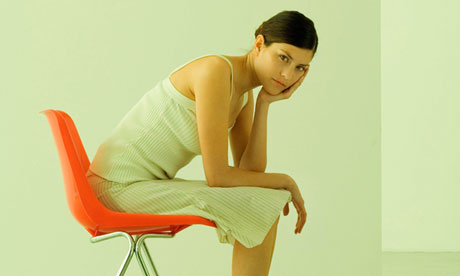Link: http://www.guardian.co.uk/lifeandstyle/2012/oct/21/is-sitting-bad-for-you?CMP=twt_gu

Energy storage mode ... it's not good for you. Photograph: Alamy Are you sitting comfortably? Well, you had better stand up. Sitting is thelatest health hazard, according to a study published this week, showing that being sedentary for hours at a time increases your risk of diabetes, heart disease and premature death.
The research, from the University of Leicester and published in the journal Diabetologia, combined the results of 18 studies and nearly 800,000 people. It found that prolonged sitting doubled the risk of diabetes and heart disease, and that the risk wasn't eliminated for those people who took regular exercise. Sitting is a low energy activity and it may be risky because it makes our bodies think we are in energy storage mode. This makes our bodies resistant to insulin (which mops up glucose), increasing the level of glucose in the blood and reducing levels of good cholesterols while increasing levels of bad ones. All of these changes increase the risk of obesity, diabetes and heart disease.
The authors of the Diabetologia study say that on average adults spend 50% to 70% of their time sitting down, either at work, watching television or using the computer. These activities use up a measly one MET (metabolic equivalent) of energy expenditure. If you walk you use four times as much energy as when you sit.
This study confirms findings from other research. An Australian paper in the Archives of Internal Medicine of more than 200,000 people aged 45 or over found that those who sat for 11 or more hours a day had a 40% increase in risk of dying over the next three years, compared with those who sat for only four hours a day. The study took into account how healthy they were, as well as their levels of physical activity and weight.
The relationship between sitting and ill health has spawned an area of study called inactivity research. Prolonged inactivity has been known for decades to contribute to back pain and obesity; now it seems we can blame it for killing people prematurely. But since most sitting occurs at work, is there anything you can do to reduce it?
The solution
What you can do to help will depend on your workplace. If you can, set an alarm to make sure you get up once an hour and walk briskly somewhere. Instead of emailing someone several desks away, speak to them in person. Stand up when taking a phone call – it uses more calories than sitting. Shun the lift and take the stairs. In meetings get up and walk around the room. There are even desks attached to treadmillsavailable, that allow people to walk slowly while working at their desks.
After work, try not to spend most of the evening watching television. Another Australian study, in the October issue of The British Journal of Sports Medicine, suggests that each hour of television watched after the age of 25 reduces life expectancy by 21.8 minutes.
Medical Disclaimer
The content of this website is provided for general informational purposes only and is not intended as, nor should it be considered a substitute for, professional medical advice. Do not use the information on this website for diagnosing or treating any medical or health condition. If you have or suspect you have a medical problem, promptly contact your professional healthcare provider.
Dr JPB Prinsloo is the oldest homoeopathic practice in South Africa.
The practice, situated in Pretoria, was established in 1956.
To learn more about homeopathy, homeopathic treatment and the legal requirements for practising as a homeopath, visit:
http://www.biocura.co.za/